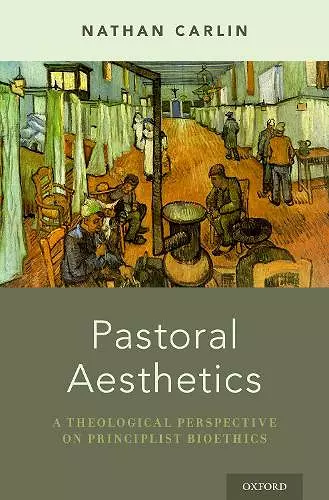Pastoral Aesthetics
A Theological Perspective on Principlist Bioethics
Format:Hardback
Publisher:Oxford University Press Inc
Published:2nd May '19
Currently unavailable, and unfortunately no date known when it will be back

It is often said that bioethics emerged from theology in the 1960s, and that since then it has grown into a secular enterprise, yielding to other disciplines and professions such as philosophy and law. During the 1970s and 1980s, a kind of secularism in biomedicine and related areas was encouraged by the need for a neutral language that could provide common ground for guiding clinical practice and research protocols. Tom Beauchamp and James Childress, in their pivotal The Principles of Biomedical Ethics, achieved this neutrality through an approach that came to be known as "principlist bioethics." In Pastoral Aesthetics, Nathan Carlin critically engages Beauchamp and Childress by revisiting the role of religion in bioethics and argues that pastoral theologians can enrich moral imagination in bioethics by cultivating an aesthetic sensibility that is theologically-informed, psychologically-sophisticated, therapeutically-oriented, and experientially-grounded. To achieve these ends, Carlin employs Paul Tillich's method of correlation by positioning four principles of bioethics with four images of pastoral care, drawing on a range of sources, including painting, fiction, memoir, poetry, journalism, cultural studies, clinical journals, classic cases in bioethics, and original pastoral care conversations. What emerges is a form of interdisciplinary inquiry that will be of special interest to bioethicists, theologians, and chaplains.
Carlin argues that pastoral theology has a lot to offer bioethics and medical care. * Christopher Mayes, Reading Religion *
In Pastoral Aesthetics, Carlin achieves two important aims relative to bioethics and religion discourse. First, he has contributed a methodology that will be usable in churches from the pulpit to the pew as well as by academic bioethicists. Second, in offering this methodology, Carlin has written an invitation to a broad conversation. In a field that has become increasingly aware of its severe problems with diversity, equity, and inclusion, I could not be more pleased * Terri Laws, Pastoral Psychology *
In addition to chaplain readers, this book is deserving of the attention of all who care about and are committed to making healthcare more compassionate, ethical, and holistic. Among that audience are no doubt a wide variety of healthcare professionals, including but not limited to ethicists, nurses, physicians, and social workers. I also trust there are many from faith communities and the broader public who share these aspirations and would benefit from their realization. * Brent W. Peery, Pastoral Psychology *
Carlin opens a much needed and long-overdue conversation about the intersection of theology, pastoral work, and bioethics. For that, and for this important volume, we are in his debt. Chaplains, those interested in religious ethics, and pastoral caregivers will want to read this important book. * Aaron Klink, Duke University, Religious Studies Review *
With admirable clarity, Nathan Carlin offers us a new way to imagine bioethics through the difficult work that is pastoral theology. Grounded in human experience, Carlin offers pastoral aesthetics as an intervention into the dominant mode of contemporary Western bioethics-principlism. * Jeffrey P. Bishop, MD, PhD, Professor of Philosophy and Theological Studies, Saint Louis University *
Nathan Carlin's nuanced theological interpretation of principlist bioethics is a distinctive and timely gift, but just as distinctive is his challenge to engage our aesthetic sensibilities through the lens of pastoral theology to more richly address the humanistic realities of ethics in health care. * Keith G. Meador, MD, ThM, MPH, Professor and Director, Center for Biomedical Ethics and Society, Vanderbilt University Medical Center *
In Pastoral Aesthetics, Nathan Carlin weaves complex conceptual strands proposed by pivotal figures from each field into a beautiful tapestry by which to inspire medical professionals, ministers, and hospital chaplains in their approaches to patient care, specifically by encouraging us to attend, to borrow from poet William Stafford, to 'the little ways that encourage good fortune.' I stand in awe of this book. * Robert C. Dykstra, Charlotte W. Newcombe Professor of Pastoral Theology, Princeton Theological Seminary *
ISBN: 9780190270148
Dimensions: 236mm x 163mm x 25mm
Weight: 408g
216 pages